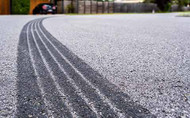Stop The Noise: Why do Tires Squeal
Posted by Agota Szabo on Dec 10th 2020
Different factors contribute to tires squealing and tire noise during their performance. As tires are always in contact with the road surface, versatile aspects allow the tires to minimize or to increase their comfort levels.
From the tire tread wear to the vehicle’s alignment, these issues can usually be fixed to improve the overall driving comfort levels.
Tires are under versatile pressure throughout their performance, which may easily create an issue during the drive. Some problems can be fixed, while others are not related to the vehicle and the tires.
Common problems include the road conditions, any type of issue with the vehicle and treadwear rate concerns. Often squeaking cannot be negated even when everything is done correctly, some tire noise will still be generated.
Why are Tires Squealing when Driving?
As we have stated before, tires may create soundwaves for various reasons. In today’s blog post, we would like to show what causes tire squeaking and what you can do to minimize this sound.

How is road and pattern noise generated? Basically, driving noise is generated with the air. The airwaves come into contact with the tread elements, creating soundwaves. Due to this, manufacturers do all they can with the tire design to significantly reduce the soundwave creation and to ensure a quiet performance.
However, sadly, other aspects may come into play and create road noise. Let’s take a look at specific problems which can be prevented with proper tire and car maintenance.
Tires are most commonly squealing when:
- Accelerating
- Turning or maneuvering
- Braking
- Reversing
What produces tire squeal?
The vehicle’s alignment, the brake pad, the tread design and the tire pressure may all affect the driving comfort levels. As a result, all must be checked if excessive road noise is heard while the tires are in motion.
Driving Conditions
The vehicle’s performance and drive can affect the noise levels. The tire’s acceleration, braking and turning, especially at high speeds, are a common cause of road noise. During acceleration the tires slip before getting adequate traction. In such instances, the small amount of the top rubber layer of the tread center gets peeled off which results in squealing.
Subsequently, the same thing happens while braking, especially under excessive braking forces. Maneuvering and cornering causes the tire to slip sideways. At the time of this transition, the car’s front will move the same way the tires will point, which will develop soundwaves.
Tire Pressure and Underinflated Tires
Another problem that is the cause of tire noise, is the air pressure. In a previous blog post, we have already expanded on the necessity of frequent tire pressure checks. But why do tires squeal when they are underinflated?
Tires with inadequate air pressure are under higher driving pressure. Turning with underinflated tires will cause the sidewall to flex too much and to lose traction. In such instances, the tread elements will not be stabilized, resulting in road and tread pattern noise.
Tire Wear, Worn-out Tires
Tires can only safely be in service if their tread depth is good. Worn-out tires not only minimize the steering, braking and performing safety, they may also generate noise during the drive. The tread wear along the footprint will create excessive squealing if the tire’s are about to be worn-out. Tires should be changed once their tread wears down to the tread wear indicator.

Furthermore, the tread wear manner is also a crucial component. Irregular wear on the footprint allows the airwaves to come into contact with the tread elements. Most uneven tread wear can be fixed by ensuring the vehicle’s alignment is corrected. However, if the tread keeps wearing in an irregular manner, tire noises will persist.
Tread Design
Continuing from our previous point, let’s talk about the pattern of new tires. Premature and uneven wear is not the only problem you may need to fix when it comes to the tires. Different tread patterns can also be the culprit when dealing with noise levels. Depending on the tire’s pattern, versatile types of road noise may be generated during the drive.
Generally speaking, designs with a symmetric pattern and equally sized elements generate the lowest noise level. Be sure to check the wear indicator on the tires frequently as well. Additionally, due to the compound elements used during manufacturing, winter tires tend to be louder.
Other Types of Car Trouble
A car consists of many components which all have to work together to ensure a smooth and safe performance. The alignment, the brakes and brake pads, the suspension parts, the steering system and a loose or worn-out engine drive belt can all generate unnecessary friction and performance noise while the vehicle is in motion.
It is also important to check your wheel bearings. They create a repetitive noise which gets louder at high speeds and during cornering. Servicing your vehicle regularly will help you to prevent such problems from arising.
Road Conditions
This is one factor you as a car owner cannot check. Unfortunately, the road surfaces can create tire noises as well. No matter if your tires and car are in top condition, sometimes the road surface will undo your hard work. New blacktop roads, crumbling road surface areas, smaller potholes and even just painted road surfaces in the parking lot can generate rubber squealing.
Getting rid of Squealing Tires
From the tire tread to the vehicle parts, there is always something else to check when it comes to the noise levels. Just one part not conforming correctly may make or break the driving comfort throughout the vehicle’s performance.
If you have checked every loose equipment and kept up with the correct vehicle maintenance, it might as well be the road surface that causes the problem.
However, it is crucial to listen to the different sounds your tires make and search for the issues they can uncover, as it may help you prevent bigger problems from arising.
















